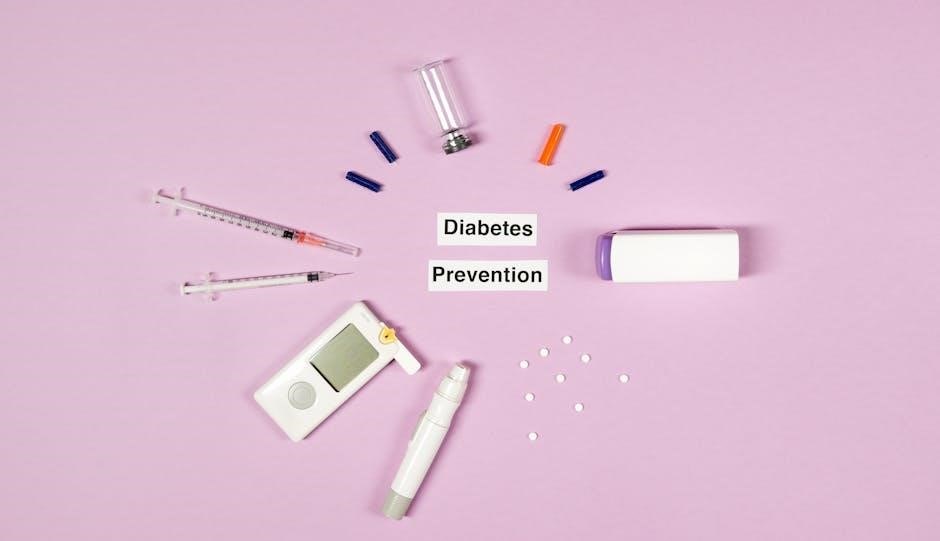Type 1 diabetes is an autoimmune condition where the immune system attacks insulin-producing cells, leading to high blood sugar. Symptoms include increased thirst, frequent urination, and weight loss.
1.1 What is Type 1 Diabetes?
Type 1 diabetes is an autoimmune condition where the immune system destroys insulin-producing cells in the pancreas, leading to a lack of insulin production. This results in high blood sugar levels, as the body cannot regulate glucose effectively. It is typically diagnosed in children and young adults but can occur at any age. Without insulin therapy, the condition can lead to serious complications, making it essential for patients to understand and manage their condition effectively through education and personalized care plans.
1.2 Symptoms and Diagnosis
Type 1 diabetes symptoms often develop rapidly and include increased thirst, frequent urination, extreme hunger, unintended weight loss, irritability, and mood changes. Diagnosis typically involves blood tests to measure glucose levels and A1C, which indicates average blood sugar control over the past 2-3 months. Early detection is critical to prevent complications and ensure timely insulin therapy. Educational resources emphasize recognizing these signs to prompt medical evaluation and proper management.
1.3 Prevalence and Demographics
Type 1 diabetes accounts for 5-10% of all diabetes cases, primarily affecting younger individuals. It is most commonly diagnosed in children and adolescents, with a median age of 11 at diagnosis. Educational resources highlight the importance of understanding its prevalence to improve awareness and early detection. Targeted education for patients and families ensures better management and support, particularly in younger populations where the condition is most prevalent.

Importance of Patient Education in Type 1 Diabetes
Patient education empowers individuals with Type 1 diabetes to manage their condition effectively, improving health outcomes through personalized care and informed decision-making.
2.1 Why Education is Crucial for Managing the Condition

Educating patients with Type 1 diabetes is essential for effective self-management. It helps individuals understand their condition, recognize symptoms, and master blood sugar regulation through diet, exercise, and insulin therapy. Proper education reduces the risk of complications, enhances adherence to treatment plans, and empowers patients to make informed decisions. This knowledge also alleviates anxiety and improves mental well-being, fostering a proactive approach to long-term health management and overall quality of life.
2.2 How Education Improves Quality of Life and Health Outcomes
Educating patients with Type 1 diabetes significantly enhances their quality of life by fostering better glycemic control, reducing complications, and improving mental well-being. Knowledge empowers individuals to make informed decisions about diet, exercise, and insulin therapy, leading to fewer hospitalizations and improved health outcomes. Structured education programs, such as DAFNE, have shown to boost confidence and self-management skills, enabling patients to maintain a balanced lifestyle and achieve long-term stability in managing their condition effectively.

Understanding Blood Glucose Management
Blood glucose management is crucial for maintaining stable sugar levels, preventing complications, and ensuring overall health in Type 1 diabetes. Proper monitoring and insulin therapy are key.
3.1 Blood Glucose Monitoring and Target Ranges
Blood glucose monitoring is essential for managing Type 1 diabetes. It involves regular checks to ensure levels stay within target ranges, typically 70-180 mg/dL. Frequent testing helps identify patterns, preventing hyperglycemia and hypoglycemia. Advanced tools like continuous glucose monitors (CGMs) provide real-time data, enhancing accuracy. Understanding target ranges and adjusting insulin doses accordingly is critical for maintaining stability and preventing complications. Consistent monitoring supports better decision-making and overall health outcomes for individuals with Type 1 diabetes.
3.2 Insulin Therapy and Dosage Adjustments
Insulin therapy is vital for Type 1 diabetes management, as it replaces the body’s inability to produce insulin. Treatment typically involves a combination of basal (long-acting) and bolus (fast-acting) insulins. Dosage adjustments are based on blood glucose levels, meal plans, and physical activity. Proper education helps patients understand how to administer insulin, interpret glucose data, and make timely adjustments to maintain target ranges and avoid complications. Regular fine-tuning ensures optimal glucose control and improved health outcomes.
3.3 The Role of Diet and Nutrition
Diet and nutrition play a crucial role in managing Type 1 diabetes, focusing on balanced meals and carbohydrate counting to maintain blood glucose control. A personalized approach, including meal planning and portion control, helps align food intake with insulin therapy. Structured education programs, such as DAFNE, teach patients to adjust insulin doses based on dietary choices. Proper nutrition education empowers individuals to make informed decisions, promoting optimal glucose levels and overall health outcomes.

Lifestyle Modifications for Type 1 Diabetes
Lifestyle modifications for Type 1 diabetes include regular exercise, stress management, and education on healthy habits to enhance glucose control and overall well-being.

4.1 Exercise and Physical Activity
Regular exercise is crucial for managing Type 1 diabetes, improving insulin sensitivity, and maintaining healthy blood sugar levels. Aerobic activities like walking or cycling are highly recommended. Strength training can also enhance overall health. Always consult with a healthcare provider to develop a personalized exercise plan tailored to individual needs and glucose levels. Staying active helps reduce stress, improves mood, and promotes long-term well-being for individuals with Type 1 diabetes.
4.2 Stress Management Techniques
Managing stress is essential for individuals with Type 1 diabetes, as high stress levels can impact blood sugar control; Techniques like deep breathing, yoga, and mindfulness can help reduce stress. Regular physical activity and meditation also promote emotional well-being. Connecting with support groups or counseling services can provide additional coping strategies. By incorporating these practices, individuals can better manage stress and improve their overall diabetes management and quality of life.

Emerging Technologies in Type 1 Diabetes Care
Continuous glucose monitors, insulin pumps, and AI-driven systems are revolutionizing Type 1 diabetes management, offering real-time monitoring and automated insulin delivery for improved blood sugar control.
5.1 Continuous Glucose Monitors (CGMs)
Continuous Glucose Monitors (CGMs) are wearable devices that track blood sugar levels throughout the day, providing real-time insights without finger pricks. They enable timely adjustments to insulin, diet, and exercise, improving glycemic control and reducing complication risks. CGMs have become a cornerstone in Type 1 diabetes management, offering enhanced accuracy and convenience. By integrating with insulin pumps, they support automated insulin delivery, further optimizing blood sugar levels and improving quality of life for individuals with Type 1 diabetes.
5.2 Insulin Pumps and Automated Insulin Delivery Systems
Insulin pumps and automated delivery systems revolutionize Type 1 diabetes management by providing continuous insulin delivery. These devices adjust dosages based on blood glucose levels, reducing the need for manual injections. Advanced systems integrate with CGMs, enabling real-time adjustments for better glycemic control. They offer flexibility, improving blood sugar stability and quality of life. Patient education is crucial for optimizing their use, ensuring safe and effective insulin therapy tailored to individual needs.
5.3 Artificial Intelligence and Mobile Health Apps
Artificial intelligence (AI) and mobile health apps are transforming Type 1 diabetes care by enabling real-time monitoring and personalized management. These tools analyze blood glucose data, predict trends, and provide insulin dosing recommendations. Apps also offer educational resources, tracking features, and remote consultations. AI-driven systems integrate with devices like CGMs and insulin pumps, enhancing adherence and improving outcomes. They empower patients to make informed decisions, fostering better glycemic control and overall diabetes management.

Psychological Support and Mental Health
Living with Type 1 diabetes can lead to emotional and mental challenges. Psychological support, counseling, and strong support systems are vital for managing stress and improving overall well-being.
6.1 The Emotional Impact of Type 1 Diabetes
Living with Type 1 diabetes can significantly impact mental health, causing stress, anxiety, and emotional distress. The constant need for glucose monitoring and insulin management can lead to feelings of frustration and fear. Many individuals experience emotional highs and lows, which may result in burnout or depression if not addressed. A strong support system and tailored educational resources are essential to help patients cope with these challenges and foster resilience.
6.2 Building a Support System
A robust support system is vital for managing Type 1 diabetes effectively. Family and friends play a crucial role by offering emotional backing and practical assistance. Peer support groups and online communities provide shared experiences and advice. Educating caregivers about the condition enhances understanding and collaboration. Additionally, healthcare providers and educators can offer guidance tailored to individual needs, fostering a network that empowers patients to maintain their well-being and navigate daily challenges with confidence and resilience.

Current Research and Advancements
Research focuses on new medications, stem cell therapies, and AI-driven tools to improve Type 1 diabetes management. These advancements aim to enhance patient care and education.
7.1 New Medications and Therapies
Recent advancements include FDA-approved drugs like Tzield, which delays Type 1 diabetes onset by up to three years. Clinical trials explore therapies targeting immune response and insulin production. Medications such as Ozempic and Wegovy are increasingly used off-label, despite limited research on their long-term effects. These innovations aim to improve glycemic control and quality of life, offering hope for better management and potential preventive measures. Patient education materials now emphasize these emerging treatments.

7.2 Stem Cell Research and Potential Cures
Stem cell research aims to regenerate insulin-producing cells, offering hope for a potential cure. Scientists are exploring methods to differentiate stem cells into functional pancreatic islets. Early-stage clinical trials show promise, but widespread therapeutic application remains years away. Patient education materials highlight these advancements, emphasizing the importance of staying informed about emerging therapies while managing current care effectively.
Effective education and advancements in care are transforming type 1 diabetes management, offering hope for improved outcomes and quality of life through continuous learning and advocacy.
8.1 Summary of Key Points
Type 1 diabetes is an autoimmune condition requiring lifelong management through insulin therapy, blood glucose monitoring, and lifestyle adjustments. Patient education empowers individuals to understand symptoms, treatment options, and dietary needs. Advances in technologies like CGMs and insulin pumps enhance care, while psychological support addresses emotional challenges. Continuous learning and advocacy are crucial for improving quality of life and health outcomes, emphasizing the importance of tailored education and innovative therapies in managing this chronic condition effectively.
8.2 Encouragement for Ongoing Learning and Advocacy
Embracing ongoing learning and advocacy is vital for thriving with Type 1 diabetes. Staying informed about new therapies, technologies, and research ensures better management and improved outcomes. Engaging with support communities and sharing experiences fosters resilience and empowerment. Advocating for awareness and accessible resources helps create a more inclusive environment for all individuals with Type 1 diabetes, promoting a proactive approach to health and well-being for years to come.